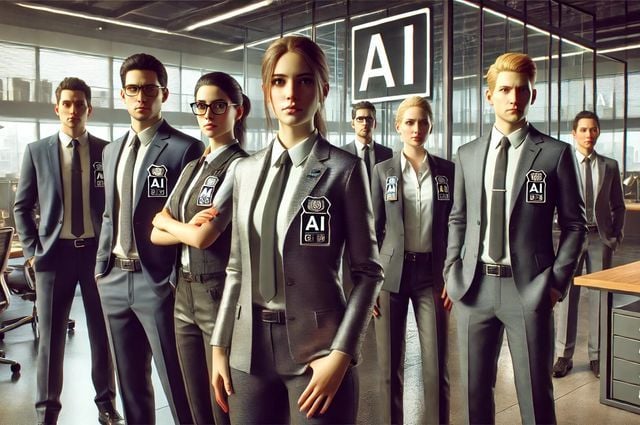Are hoteliers ready for the new era of personal AI Agents?
15 experts shared their view
Recently Google's CEO Sundar Pichai proclaimed that the ultimate goal of their Gemini AI is the creation of a "universal AI agent that will be useful in everyday life."
There have been heated discussions in the media about the expected rise in 2025 of the personal AI agents and their impact on travel and hospitality distribution.
The presumption is that AI agents can research, plan and book travelers' vacations autonomously, thus circumventing OTAs and other intermediaries.
Some experts even predict that the AI agents will dramatically change the current travel distribution status quo and even make the OTAs obsolete thus establishing the golden age of direct consumer-supplier relationships.
Mario Gavira, VP of Growth at Kiwi summarized well this belief: "The personal AI agents promise to cut through the complexity of travel planning like a hot knife through butter, connecting directly with supplier websites and APIs to create the perfect itinerary."
Other experts claim that the OTAs will be the beneficiaries of the AI agents, since they are already investing heavily in the adoption of AI, and in the same way they have mastered SEO, the OTAs will master AIO - artificial intelligence optimization, in order their offerings to found first by the personal AI agents.
The question is, how can hoteliers prepare for the rise of the personal AI agents and be the ultimate beneficiaries of this exciting AI era?
The first observation is that things are developing very quickly. As compared to Moore's law, the pace of next generation AI capablities are developing at a speed that is hard to fathom based upon our species past technical endeavours.
Are we ready? No. The truth is that as an industry, we do not generally adopt and adapt swiftly.
Further, the external AI game is largely driven by structured information to return the type of data an external AI tool seeks. Also, to be the third party that is the 'go to' authorative source of information, chosen by the AI tool as the first (top level) cab off the rank.
Therefore, from the external AI perpective the imperative is to be 'found' in this new techical paradigm. Guess what? 'Twas always thus.
We can appreciate the excitement for AI developments. For example travel planning, regardless of who is doing it, requires a significant investment in time. At the same time, I am under no illusion that the shopper will accept the first option presented either. After all people generally look for a bargain, which therefore requires trust in the information returned from the AI toolset.
Time to start developing the plan!
AI Agents are a fundamentally different way to interact with data and knowledge. We are now in the phase of replicating the current status with agents (for example, to build a travel itinerary), like the first TV programs were radio shows with a camera, but pretty quickly we'll evolve to find new ways of doing the same things.
A couple of concepts will take shape: one, agents will talk to one another, so both the guest and the hotels will have their personalized agents. Two, people/consumers will never call a phone number and talk to a real person: it will always be an AI agent.
Hotels need to prepare for these scenarios, which are not so much substitutive as additional to the current ones. Websites will not disappear, apps will not go away, and agents will be a new channel to interact with guests.
No, most hoteliers are not ready for the new era of personal AI agents. Hotels have historically been cautious about new technology, and for good reason. But AI-driven hotel discovery isn't necessarily about tech adoption. It's about storytelling.AI relies on natural language processing, so hotels should publish blog posts and substantive content that answer traveler queries on their websites. Hotel marketers have recommended this strategy for many years, but only a small percentage of hotels have invested in this approach. Earned media is the level-up from this approach. AI models consider credibility, so content from authoritative media brands, like Condé Nast Traveler and Travel + Leisure, is essential, especially as major publishers like Dotash Meredith forge partnerships and licensing agreements with platforms like OpenAI.If hotels consider preparing for AI agents an investment in content marketing rather than "tech adoption," the strategy becomes less risky. Platforms and channels constantly shift, but high-value travelers will always seek trustworthy content to make booking decisions. Without quality content to answer their potential guests' questions and inspire confidence, hotels will be unprepared for AI agents and see subpar results from their overall guest acquisition efforts.
The rise of personal AI agents will transform travel booking, but rather than seeing AI as a competitor, hoteliers must treat it as a team member that requires training and support to enhance guest and employee experiences.
To succeed, hoteliers must:
- Train AI Like an Employee – AI requires structured data and ongoing refinement to automate tasks while maintaining a seamless, human-led experience.
- Empower the Human Team – AI should handle repetitive functions, freeing employees to focus on personalized, high-value guest interactions.
- Strengthen Guest Relationships – AI can optimize loyalty programs and personalize offers, but hospitality is built on emotional connection, warmth, and intuition.
When properly trained and integrated, AI enhances efficiency, supports staff, and improves guest experiences—but it does not replace the human touch. Hoteliers who embrace AI as an enabler will lead the future of hospitality.
For hoteliers to thrive in the era of personal AI agents, brands should embrace AI as an assistant to both staff and guests. To do so, they should consider the following strategies:
- Enhance Staff Efficiency with AI Assistants: Equip your staff with AI tools to enhance their efficiency and service quality. AI assistants can manage routine inquiries, allowing human staff to focus on personalized, high-touch interactions, ensuring guest engagement remains a priority.
- Develop AI-Friendly Infrastructure: Create seamless integration with guest AI technologies by building compatible platforms. Utilize open APIs to enable guests' AI agents to manage bookings, in-room preferences, and service requests, creating a frictionless and tailored guest experience.
- Prioritize Personalization and Optimization: Leverage AI-powered data analytics to gain deeper insights into guest preferences for real-time personalization. AI can also optimize dynamic pricing and marketing, maximizing revenue and occupancy.
By embracing AI as an assistant to both staff and guests, hoteliers can position themselves as leaders in intelligent hospitality. This helps ensure their properties remain competitive and appealing to guests who utilize AI agents. This proactive approach will be key to benefiting from the opportunities presented by the rise of personal AI agents in the travel industry.
Question: which travel entities were the first one to integrate with generative AI platforms like ChatGPT, Claude and Perplexity? Global airlines? Major hotel chains? Mega cruise lines? Nah, these were the OTAs. Travel suppliers, once again, were slow, hesitant and late adopters.
The same is happening today with the first AI agents like ChatGPT Operator, which gets access to travel pricing, availability and inventory from OTAs like Booking, meta platforms like Kayak and TripAdvisor. There is a simple reason for that: the LLMs go to the OTA platforms because with one integration they can access all the travel inventory worth having access to, and instantly make money from OTA affiliate commissions.How can independent hotels get noticed by AI Agents?
- Make your website content SEO and AIO (AI search)-friendly: Original, editorial-level content, on-page SEO, inbound/backlinks and citations from highly authoritative websites; technical SEO, etc.
- Discuss with your CRS, Channel manager or cloud PMS provider how they can integrate with the genAI platforms.
- Google Gemini AI in its answers/recommendations features property rates from its Google Hotel Ads (GHA) program. Your property must join the free booking listings of GHA and participate in the paid GHA in need periods.
The short answer is No. The longer answer is: No and they will not be ready soon. Personal AI agents raise significant technological, operational, marketing, and financial challenges for hotels. They can make decisions autonomously and implement tasks independent of direct human supervision. This means that a personal AI agent for hotel bookings may quickly search and compare hotel offers, choose the one that fits the requirements of its owner and book. In this case, the purchase decision was made by the AI agent, not the human. Hotels' marketing strategies implicitly assume that purchase decisions are made by human customers. When customers start using personal AI agents for bookings, hotels will need to change this assumption and transform their marketing strategies.
But there is good news: as the adoption of personal AI agents will be a gradual process that will take years, hoteliers have sufficient time to adapt if they want their marketing strategies to be relevant to the new technological realities. Hotel chains will lead (again) this transformation because they have the financial resources and enjoy the economies of scale required to implement the needed technological investments.
This is probably one of the most important dilemmas of the Age of the Agents. Are we heading towards a scenario where every single person is going to have their own personal agent, or on the contrary, are we heading towards a scenario where every single company is going to have its own agent?
Either of these two scenarios will dramatically disrupt the digital environment that involves customers, product/service companies, and the distributors in the middle.
If you analyze what is happening nowadays—for instance, what Google is doing with Gemini, OpenAI with ChatGPT, or Perplexity—it looks like these companies are working towards the first scenario, where we are going to have our personal agent, which will be "surfing" the internet (if we can still call it that) on behalf of each of us.
If the personal agent is going to be our next platform, then we will face a situation that will disrupt everything we know about managing the digital customer lifecycle. How are you going to influence and personalize your customer proposal in a situation where another personal assistant is managing the interaction?
I definitely don't know of any company that is prepared for this.
As I argued in a recent article, we are witnessing the decline of traditional travel search in favor of AI-powered systems that anticipate and ACT upon travelers' needs.
Now, I think there are two conflicting viewpoints on whether AI agents will favor OTAs or hotels:
- The Direct-Centric Argument: AI agents, by directly interacting with supplier websites, could weaken OTA dominance and usher in a new golden age of direct bookings. If properly optimized, hotel websites could become the primary source for AI-driven transactions, reducing dependency on intermediaries.
- The OTA-Centric Argument: OTAs, with their massive data ecosystems and expertise in AI-driven optimization (what I call Artificial Intelligence Optimization or AIO), are best positioned to benefit.
In reality, the advantage will likely go to those who proactively adapt. Hotels that fail to optimize for AI-driven interactions risk being sidelined, while those that embrace AI-ready strategies could carve out a direct booking advantage.
To ensure AI visibility, hoteliers must conduct an "AI Audit" of booking engine and website to identify barriers (CAPTCHAs, excessive form fields, or fragmented data) that could derail autonomous agents.
Focus on "agent experience" rather than on "user experience." If you build it (for agents), they (the guests) will come...
Interesting one this. I would Imagine the first thought for hoteliers would be how much will the commission be? but this is a potential goldmine for those that get this right. This will happen sooner than later. The major hurdle I see is how the technology stack is assembled in hospitality. Try and go on a hotel branded website and reserve in one "basket" just like we do on e-commerce, a hotel room for one-night, top floor away from the elevator, dinner for two, a Spa treatment and a small conference room for one hour the next day. Basically impossible. And this is where the problem lies. Without a streamlined and interconnected technology stack this will hinder the adoption of AI assistants. So an amazing potential for direct bookings for hotels that will probably go the way of the OTA and fall into the hands of a third party.
The advent of personal AI agents, as highlighted by Google's Gemini project, signifies a transformative shift in the hospitality industry. While some predict that these agents will disintermediate OTAs, enabling direct consumer-supplier relationships, I see a more nuanced evolution. The true beneficiaries will be those who can harness the power of Big Data to create deeply personalized guest experiences.
Hotels have a unique advantage—they possess rich, first-party guest data that, if properly consolidated and utilized, can surpass the insights OTAs rely on. The key lies in establishing a Central Guest Profile that integrates all data touchpoints across the guest journey. This single source of truth empowers hoteliers to exceed the personalized offerings AI agents will curate.
However, the rise of AI also demands a proactive approach. Hoteliers must invest in AI-driven data management systems and ensure seamless integration across their tech stacks. Without this foundation, they risk being overshadowed by OTAs, which are already mastering Artificial Intelligence Optimization (AIO) to secure their dominance.
In this exciting AI era, those who can translate Big Data into actionable guest insights will thrive. The future belongs to hotels that embrace digitization, automate personalization, and build direct, meaningful relationships with their guests.
I believe OTAs will come out as net beneficiaries, at least in the early stages. While larger chains already have an integrated tech stack that can be easily extended to work with AI agents (using interfaces like Anthropic's MCP, for example), many independent hotels and smaller chains face significant issues:
1. They rely on legacy PMS and IBE systems, which are difficult to integrate due to the frequent lack of APIs and/or limited flexibility, and whose vendors are often not too keen to improve and open. This makes it extremely challenging to offer real-time pricing to external platforms such as AI agents.
2. They often lack the vision, in-house expertise or budget to migrate to newer technology, until they notice a drop in revenue for their direct channels.
3. They typically don't have a solid content strategy and the platforms used for their websites are usually monolithic, complicating AIO - including the integration with agents - for similar reasons as point 1.
How can hoteliers prepare for the future? A comprehensive review of their entire stack is the number one focus, and it needs to happen as soon as possible: it's a lot of grunt work to modernize the whole flow.
Hoteliers today will feel like they are treading water, grasping for clarity over what kind of impact AI agents will ultimately have on their businesses.
Fortunately for them, they won't have to wait long to find out – this change is coming thick and fast.
AI agents will forever change the way people plan and book their travel. This could sideline those hotels that have traditionally been slow to modernize their tech stacks while accelerating the success of those that invest in the foundations today. The OTAs can sink as much money as they want into their own AI projects, but – make no mistake – hotels that play their cards right can use AI agents as a golden ticket to bypass the middlemen and connect directly with guests.
The one thing hotels should do today is ensure their infrastructure is flexible enough to incorporate the innovations of tomorrow. Hotels running on rigid and traditional systems will struggle. While those with truly open technology will be quicker to adapt, integrating with AI agents performing specific functions, such as business intelligence tools with real-time alerts for missed targets, or a marketing and sales agent that specifically manages promotion marketing based on seasonality.
AI Agents work by exploiting a combination of tools and search capabilities to respond to user requests. For hoteliers, this places them in pole to become key beneficiaries of the AI era.
To reap the rewards of personalised AI agents, hoteliers must first prepare in advance. Optimising their digital presence by ensuring they are both search-friendly and AI-accessible is the first step, while also investing in AI-driven solutions tailored to their business needs. Success in the AI movement relies on implementing robust data collection and management systems, providing high-quality data for AI agents to analyse and personalise guest interactions. As hoteliers adopt more AI solutions, it is imperative that they have strong cybersecurity measures in place to protect sensitive data and systems.
By embracing personal AI agents, hoteliers can benefit by elevating guest experiences, maximising occupancy and revenue, and driving operational efficiency - positioning themselves at the forefront of the hospitality industry's AI transformation.
AI is evolving from content generation—text, images, and videos—to performing tasks autonomously. In hospitality, where repetitive tasks are still (often) the norm (think SOPs), this shift will be transformational. AI-driven automation is already making an impact, with Onsai, a telephone AI agent, successfully handling guest inquiries and reservations. Likewise, Apaleo, a flexible property management system, is introducing the first AI agents to streamline hotel operations.
It's almost with certainty that personal AI agents will fundamentally reshape travel booking. These agents will research, compare, and book trips autonomously, potentially bypassing OTAs and metasearch platforms in favor of direct supplier connections. This shift could give hoteliers more control over distribution. However, OTAs are already investing heavily in AI to maintain their power dominance.
For hoteliers, AI presents both challenges and opportunities. AI-driven automation can optimize operations, reducing inefficiencies in areas like front desk services and guest relations. However, to capitalize on this shift, hotels must adapt—ensuring their booking platforms are AI-compatible, integrating structured data, and leveraging AI agents.















